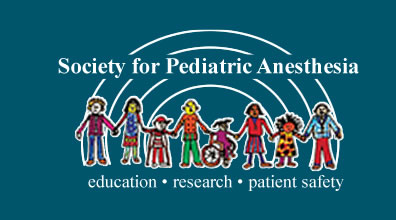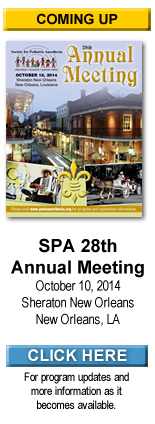Non-governmental Organization Anesthesia Clinical Outcomes Registry
By Richard Gillerman, MD, PhD
Warren Alpert School of Medicine, Brown University
Providence, RI
and Faye M. Evans, MD
Chair, SPA Committee on International Education and Service
Department of Anesthesiology, Perioperative and Pain Medicine
Boston Children's Hospital
Boston, MA
Calling All SPA NGO Overseas Surgical Trip Volunteers!
Many SPA members are actively involved in anesthesia care delivery in low-resource settings around the globe. Volunteer activities include providing direct patient care on overseas surgical trips, educating colleagues abroad, or participating in some hybrid model between the two. Similar to surgical cases in the U.S., those models that involve direct patient care incur the risk of adverse patient outcomes. To better monitor and evaluate these events, the Anesthesia Quality Institute (AQI) has recently instituted a new Non-governmental Organization (NGO) registry similar to the existing National Anesthesia Clinical Outcomes Registry (NACOR) for U.S. based practices.
Improving patient safety and the quality of care delivered on overseas NGO trips is a goal to which all NGOs ascribe. However, data that might help guide important decisions as they relate to quality and safety may be hard to come by. NGOs may have less vigorous Quality Improvement programs than U.S. based practices because of size limitations, resource constraints, the volunteer nature of their workforce, and a myriad other reasons. Benchmarking outcomes to those of similar organizations has been particularly difficult because most NGOs have operated with a silo mentality, understandably reluctant to share outcome data. Despite these obstacles, it is imperative that attempts be made to monitor and evaluate quality and outcome information on these trips, while still taking into account variability that may exist from one venue or organization to another. Such a project has been taken on by the AQI and endorsed by the SPA Committee on International Education and Service.
The potential benefits of this project are numerous; it will give NGOs who have been providing important surgical and anesthesia care around the world for years a tool by which they can work to improve the safety and quality of care delivered to their patients. Organizations will be better able to evaluate the effects of their patient care delivery model(s), the equipment and monitoring they use, provider types utilized, their patients’ co-morbidities, and other variables. Hopefully, this information will help participating NGOs make more informed decisions about how best to allocate resources for the best possible outcomes.
Here’s how it works:
- To participate in the project an NGO must meet certain basic qualifications:
- At least part of the NGO’s overall service model must include sending surgical teams to provide direct patient care (service trips with an educational component qualify).
- The NGO sends service trips to low or middle-income countries.
- The NGO team is composed of at a minimum one surgeon and one anesthesiologist, each of whom is western-trained and board certified or equivalent (service trips where part of the care is provided or assisted by additional non-western trained providers, including anesthesia providers qualify).
- The NGO makes a commitment to an internal QI process (if not pre-existing) with AQI submission as the foundation.
- There is a special AQI NGO agreement form that requires formal review and approval by the NGO leadership.
- A case data and outcomes form, with outcomes relevant for overseas NGO work, has been developed and vetted both by several NGOs and the SPA Committee on International Education and Service.
- The input form is divided into Intraoperative, PACU, and Post-PACU phases of care.
- The input form collects patient and case specific data including age, weight, gender, co-morbidities, procedure, ASA, equipment and monitoring specifics, anesthesia type, anesthesia provider type, anesthesia provider level of training, and other variables as well as outcomes
- Multiple methods exist by which the NGO can choose to enter data.
- The NGO will have access to a web based reporting dashboard.
As with the U.S. based NACOR data, the success of this project will depend on the collection of good data, and lots of it. Just as with NACOR, in exchange for participation, a NGO’s individual case and outcome data will be available only to that NGO, to be benchmarked against aggregate NGO outcome data. Only through the participation of multiple NGOs from small to large, can we hope to identify trends in overseas surgical trip outcomes that will help to lead an NGO, or the international anesthesia community as a whole, towards safer and higher quality delivery of anesthesia care in this environment.
This is just the beginning. Once underway, this project can be developed in many directions:
- Drilldown reporting on sentinel events such as death, cardiac arrest, or unplanned ICU stay.
- Development by the AQI of an online NGO event reporting form.
- Formation of an umbrella QI committee of participating NGOs to discuss sentinel events and other trends identified in the NGO AQI data and dissemination of information back to all NGOs.
- Research opportunities on aggregate data looking at the affect of multiple variables on outcomes.
- Expansion to participation by academic institutions who have their own overseas programs or NGOs that sponsor overseas surgeries by local providers.
- Endorsement of participating NGOs by national anesthesia or funding organizations.
During the development of this program a few questions have come up.
- What is the cost of participating? Nothing. The AQI and the ASA have embraced this project and are graciously providing it free of charge to NGOs conducting overseas surgical service trips.
- Is this designed to replace a NGO’s internal QA/QI process? No. This program is designed to complement and enhance a NGO’s internal review process. If not pre-existing, this program can serve as a foundation for the development of a QA/QI program by a NGO.
- Does a NGO expose itself to liability by participating in this project? The AQI is a Patient Safety Organization, recognized by federal law. That protects U.S. submitted outcomes from discoverability. Though international data collected from this project do not have the same formal protections, consultation with both AQI and malpractice attorneys place the risk of discoverability by an overseas concern at an extremely low level. The benefits to this project far outweigh the theoretical risks of exposure.
So, if you volunteer for a NGO that may meet the requirements above, please talk to your organization’s leadership NOW about participating in this exciting project. You can get more information by emailing info@aqihq.org directly, or either of the authors, rgillerman@gmail.com, or faymazo@me.com.


